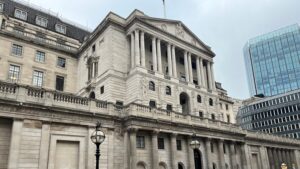Sunday 24 April
- – French Presidential election – second round run-off
Monday 25 April
- – Rightmove UK house price index
- – German Ifo business climate survey
- – Belgian Courbe Synthetique business climate survey
- – In Europe, quarterly results from Philips
- – In the US, quarterly results from Coca-Cola, Activision Blizzard and Whirlpool
Tuesday 26 April
- – First-half results from Associated British Foods
- – Trading updates or quarterly results from HSBC and Taylor Wimpey
- – Japanese inflation
- – US Government borrowing figures
- – US durable goods orders
- – US Case-Shiller house price index
- – US Conference Board consumer confidence index
- – US new homes sales
- – In Europe, a trading update from Novartis, UBS, Atlas Copco and SKF
- – In the US, quarterly results from Microsoft, Alphabet, Visa, PepsiCo, UPS, Texas Instruments, General Electric, Mondelez, 3M, General Motors and Wolfspeed
With jitters in the tech sector at an all-time high, the pressure is on for Google parent Alphabet to deliver, said Hargreaves Lansdown equity analyst Sophie Lund-Yates.
“Ad revenues are slated to rise close to 23% in the first quarter, and any disappointment on that front won’t be well received. An inflationary environment means companies are likely to be looking to save on costs, and digital advertising is cheaper than TV ads or billboards, so this may well be acting as a tailwind. Apart from this, watching out for progress on Cloud profitability is key. This is an exciting growth driver, and progress should be showing.”
Wednesday 27 April
- – First-half results from WH Smith
- – Trading statement or quarterly results from Glaxosmithkline, Lloyds, London Stock Exchange Group, AVEVA, WPP, Persimmon, Fresnillo and Nichols
- – Bank of Japan interest rate decision
- – US oil inventories
- – US pending homes sales
- – In Asia, quarterly results from Kweichow Moutai, SK Hynix, UMC
- – Europe, quarterly results from Daimler, STMicroelectronics, Kone, Unicredit and Puma
- – In the US, quarterly results from Meta Platforms, Qualcomm, Boeing, Kraft Heinz, Xilinx, United Rentals and Spotify
Lund-Yates said Meta has had a difficult time of late. Shares are currently down 45% year-to-date, nearly as dismal as Netflix’s 63% drop.
While some of this is down to the wider tech sell-off, Lund-Yates said Facebook’s parent company has also been hit by slowing revenue expectations.
“The exceptional demand seen in prior periods means this is somewhat understandable, but it doesn’t match up to everyone else in the digital ad space,” she explained. “The reasons behind that could hint at Facebook’s reduced potency in the age of TikTok, but it would be wrong to dismiss this social media giant. Its current valuation makes it an interesting option for tech investors.”
Thursday 28 April
- – Full-year results from Sainsbury and Whitbread
- – Trading statements or first-quarter results from Barclays, Unilever, Glencore, Standard Chartered, Smith & Nephew, Spectris, Grafton, Inchcape and Lancashire Holdings
With regard to Unilever, AJ Bell investment director Russ Mould and financial analyst Danni Hewson said: “The personal goods-to-food-to-home care group’s fabulous collection of brands and global reach mean that if any firm can give investors a feel for how companies are managing input costs, pricing and margins, as well as ongoing disruption to global trade flows and the war in Ukraine, then surely Unilever can.
“The consumer-to-personal goods giant’s share price has yet to recover from the fall-out created by January’s failed £50bn bid for the consumer products jointly-owned by Glaxosmithkline and Pfizer, even though boss Alan Jope has promised that no other big deals would be considered. The shares are languishing at five-year lows.
“February’s full-year results hardly helped, as Unilever warned of margin pressure, as it gave forecasts for 2022 and it is by those forecasts that the first-quarter estimates will be judged.
“Unilever has forecast underlying sales growth of between 4.5% and 6.5% for this year overall, helped by higher prices. For the first quarter along, analysts are looking for a headline sales figure of €13.2bn. That is an increase of 7.4% year-on-year but once you strip out currency movements and acquisitions then the underlying growth rate is seen reaching 4.4% – the bottom end of the target range.”
Mould and Hewson added: “Unilever has acknowledged that those higher prices could cost it some volume growth along the way and the mix will therefore also be of interest. For the quarter, analysts are looking for 6.3% growth in prices and 1.7% drop in volumes.”
- – Bank of Japan interest rate decision
- – US Q1 GDP growth
- – In Asia, quarterly results from Samsung Electronics, CNOOC and Baidu
- – In Europe, quarterly results from TotalEnergies, Nokia, Beiersdorf, Repsol and Volvo Car
- – In the US, quarterly results from Apple, Amazon, Mastercard, Comcast, Intel, McDonald’s, Caterpillar, Altria, Ford, KLA Corporation, Hershey, Twitter, Southwest Airlines, Royal Caribbean Cruises and Skyworks
“The US Bureau of Economic Analysis (BEA) will release its first – of three – estimates for first-quarter GDP growth in the USA on Thursday 28 April,” said Mould and Hewson.
“GDP growth data is neither of use nor ornament when it comes to portfolio allocation strategies and fund or individual stock selection. It is backward looking, for starters, and financial markets are forward looking. In addition, the record of economists, let alone central bankers, when it comes to forecasting recessions is nothing short of appalling – the BEA only called the 2007-09 US downturn in late 2008, a year after it had begun.
“That just goes to show how hard it is and by the time economists have cottoned on then share and bond and commodity prices – as well as currencies – are likely to have been way ahead of them.”
Mould and Hewson added: “Nevertheless, this print for Q1 should be more interesting than normal, as concerns grow that the US economy is slowing down, thanks to rising inflation, higher bond yields and interests costs on its huge federal, corporate and consumer debts, the impact of the war in Ukraine and an end to the fiscal and monetary stimulus which did so much to buoy 2020 and 2021.”
At the start of January the consensus estimate was 3.9%, while in the fourth quarter of 2021 the US economy grew at 6.9%, so estimates have been sliding lower – with the Atlanta Fed GDP Now survey looking for 1.1%; the US Conference Board 1.5% and the Philadelphia Fed’s survey pointing to 1.8%.
“For reference, for 2022 as a whole, the Conference Board is looking for US GDP growth of 3%, the Philadelphia Fed survey points to 3.7% and the International Monetary Fund is looking for 4%. Those figures all suggest a slowdown from 2021’s rebound of 10%, but nothing like a recession,” Mould and Hewson said.
Friday 29 April
- – Trading statements or first-quarter results from Astrazeneca, Natwest, Reckitt Benckiser, Travis Perkins and Pearson
- – US Personal Consumption Expenditure index
- – In Asia, quarterly results from AIA
- – In Europe, quarterly results from BASF and Ørsted
- – In the US, quarterly results from ExxonMobil, Chevron, Honeywell and Colgate-Palmolive
Saturday 30 April
- – Chinese purchasing managers’ indices (PMIs) for manufacturing and services industries







